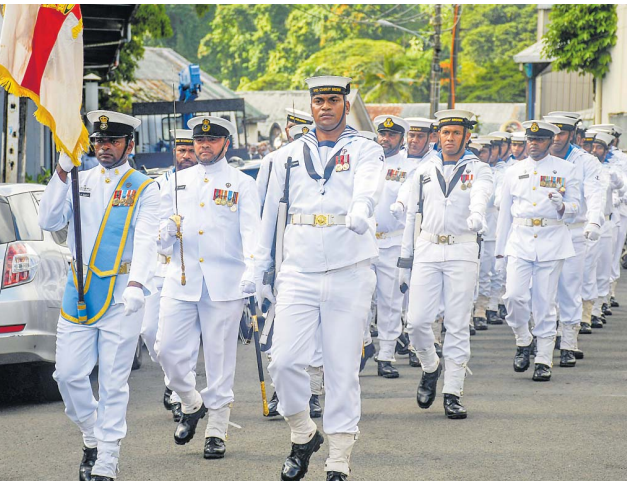That weight on my chest. The cool metal. The silent acknowledgment. As a former officer, my military medal wasn’t mere decoration; it was a sacred testament to sacrifice and duty performed beyond expectation. It embodied the solemn trust of the institution and the nation. That profound meaning is now under siege in Fiji. We are witnessing a dangerous shift, where military honours risk becoming cheap political currency, echoing Pyongyang’s spectacle far more than the Commonwealth’s revered tradition. The recent 50th-anniversary awards for the Fiji Navy aren’t just a symptom; they are a glaring confirmation of this betrayal.
The Commonwealth tradition, our inherited standard, treats military decorations with nearreverence. Medals like the Victoria Cross, or our own RFMF honours, were never participation trophies. They were, and must remain, rare symbols of exceptional valour, conspicuous gallantry, or sustained meritorious service under demanding circumstances. Scarcity is the essence. It gives the medal its weight, distinguishes the recipient, and inspires others towards genuine excellence. It’s a global language of honour understood by professional militaries.
Contrast this with the North Korean model — a dystopian parody. Medals cascade like confetti: for loyalty displays, participation in regime pageantry, or simply existing within the ruling hierarchy. They are tools of political control, devoid of military merit. The sheer volume renders each award meaningless, celebrating fealty over courage, obscuring the absence of genuine achievement.
Fiji’s trajectory is alarmingly familiar. We are actively “finding reasons to award medals,” diluting their significance. Service once considered simply competent duty, is now elevated. Anniversaries, routine postings, perceived political alignment — these are increasingly the criteria, lowering the bar not due to extraordinary circumstances, but through institutional inflation.
The Fiji Navy’s 50th anniversary awards crystallise this corrosion. Consider the voices of those actually present at the creation: veterans of the 1975 mission to the United States to bring Fiji’s first minesweepers home. These sailors, soldiers, and engineers — many in the lower ranks — navigated uncharted waters, literally and figuratively, laying the hard, unglamorous foundations of the naval service. Their reward for these “hard yards”? Omission.
As one former Navy sailor starkly observed: “Many naval vets are disappointed to miss out and are shocked … but not surprised ….that senior officers including some senior current and former Army officers with no naval service, have hogged the medals list for themselves.” This isn’t just disappointment; it’s a damning indictment. It exposes the rot at the core of our current approach:
1. Theft of Recognition: Medals intended for naval service were allegedly diverted to senior officers, including Army personnel with no naval connection, bypassing the very veterans whose blood, sweat, and toil built the institution being celebrated. This isn’t just oversight; it’s the active appropriation of honour by rank and connection, not merit or relevant service.
2. Confirmation of Cynicism: The veterans are “shocked … but not surprised.” This chilling acceptance reveals how deeply the perception of politicization and cronyism has eroded faith within the ranks. When expecting injustice becomes the norm, the institution’s moral authority collapses.
3. Devaluation Amplified: This episode doesn’t just cheapen the *new* medals; it retroactively tarnishes the significance of all service rendered in 1975. If those foundational efforts weren’t deemed worthy now, on the very anniversary they enabled, what does that say about the value we place on genuine, historical contribution? The consequences of this medal inflation, exemplified by the Navy fiasco, are profoundly corrosive:
q True Sacrifice Diminished: The valour of those who earned medals through exceptional service is drowned in a sea of mediocrity and political favouritism. Their honour is stolen twice over.
q Professionalism Eroded: Why strive for excellence if promotion and connections guarantee recognition, while genuine, foundational service is ignored? This breeds resentment, cynicism, and destroys the meritocracy vital for a professional fighting force.
q Public Trust Shattered: When the public sees senior current and former Army officers receiving naval anniversary medals over the Navy’s own pioneers, respect evaporates. Awards become objects of derision, undermining the entire military’s credibility and the real sacrifices it makes.
q The Authoritarian Drift: Flooding loyalists with medals, regardless of relevant merit, is straight from the playbook of regimes prioritising fealty over excellence. It shifts focus from service to the nation through military duty, to service to the current power structure.
Fiji is not North Korea. Our military has a proud Commonwealth heritage. But traditions decay when principle is abandoned for expediency. The Navy anniversary awards are not an anomaly; they are a stark warning sign. We stand at a precipice.
Do we uphold the rigorous, meaningful standard of military honours — where medals like those for the 1975 minesweeper mission go unequivocally to the men who sailed them home? Or do we accelerate down the path where sacred metal becomes hollow medallions, awarded by rank and connection, betraying the very veterans who built the institutions we purport to honour?
The weight on the chest must come from earned distinction, not political gravity. We must urgently restore strict, transparent criteria rooted in demonstrable merit and relevant service. To do otherwise isn’t just to cheapen metal; it’s to desecrate the legacy of service, sacrifice, and the honour of Fiji itself — starting with the betrayal of those who brought our first Navy ships home. Their missed medals are a gaping wound in our national conscience. We must heal it.



